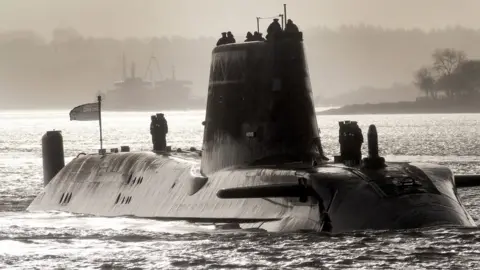Rishi Sunak announces £5bn extra defence spending during US trip
 Getty Images
Getty ImagesUK Prime Minister Rishi Sunak has vowed to increase defence spending by nearly £5bn over the next two years to counter threats from hostile states.
The funding was outlined in a new UK foreign and security strategy that cast China as a challenge to world order.
It comes as talks continue between the prime minister and his US and Australian counterparts in California.
The trio are set to agree details of a UK-US pact to supply Australia with nuclear-powered submarines.
The agreement, known as the Aukus pact, was signed in 2021 as part of a joint effort to counter Chinese military power in the Indo-Pacific region.
The UK government says £3bn from the extra spending would be earmarked to support the pact, along with boosting industrial infrastructure and servicing UK submarines.
The remaining £1.9bn will be used to replace weapons sent to Ukraine and improve the UK's munitions infrastructure.
Of the new money, £1.98bn will be spent this year and £2.97bn next year, with defence spending then reviewed again after 2025.
Moving forward, the government has an "aspiration" to invest 2.5% of national income over time, but has not specified a timeframe.
Mr Sunak's predecessor Liz Truss had committed to spend 3% of GDP on defence by 2030 - but the prime minister has stepped back from that pledge.
'Stand our ground'
A new version of the so-called Integrated Review was published on Monday, replacing the first version of the policy document unveiled under former Prime Minister Boris Johnson in 2021.
The update was ordered by Ms Truss in September last year to take account of Russia's invasion of Ukraine.
In a foreword to the document, Mr Sunak said the previous review could not have foreseen "the pace of the geopolitical change and the extent of its impact on the UK".
The review's main conclusion, Mr Sunak wrote, "is that unless democracies like our own do more to build our resilience and out-cooperate and out-compete those that are driving instability, the global security situation will deteriorate further".
While the review identified Russia as "the most pressing national security and foreign policy priority in the short-to-medium term", it also described China as posing an "epoch-defining and systemic challenge" to the international order.
Announcements in the review included:
- A one-off payment of £20m to the BBC World Service to protect all 42 of its language services over the next two years
- Extra funding for Mandarin language training and diplomatic expertise on China
- A new approach to guaranteeing UK access to minerals critical to new industries
- A new training curriculum for security officials, as well as a unit within MI5 to offer security advice to businesses and other organisations
Making the announcements in Parliament, Foreign Secretary James Cleverly said "threats have grown and systematic competition has intensified" since the last integrated review in 2021.
He said the UK "cannot be blind to the increasingly aggressive military and economic behaviour of the Chinese Communist Party".
"We will increase our national security protections and ensure alignment with both our core allies and a wider set of international partners," he said.
 PA Media
PA MediaThe review's emphasis on China has been welcomed by Mr Sunak's MPs, but some would prefer him to take an even tougher position.
And there are concerns from others that the promises being made for defence spending don't go far enough.
While Defence Secretary Ben Wallace has publicly welcomed the extra £5bn announced by the prime minister, he had been hoping for considerably more.
The Conservative chairman of the Defence Committee, Tobias Ellwood, said Mr Wallace wanted double that "just to stay level" after years of military spending cuts.
Mr Ellwood said Russia and China "will be breathing a sigh of relief that we haven't invested further".
He argued the next two years will be "very dangerous indeed" and that the UK needed more "hard power".
Labour rubbished Mr Sunak's promise, and said defence spending had not hit 2.5% of GDP since it had left power.
John Healey, the shadow defence secretary, said the Conservatives were "failing to secure Britain's national defence for the future".
He said the integrated review "will not address concerns over critical capabilities which weaken our national defence and undermine the UK's Nato obligations".
Labour, he said, would publish a defence and security review in its first year of government "to make sure capabilities match the threats we face".
The unveiling of the update has been choreographed to coincide with Mr Sunak's visit to California, where he is discussing the Aukus pact with US President Joe Biden and Australian Prime Minister Anthony Albanese.
Reports have suggested Australia could opt to build a modified version of the British Astute-class submarine, while taking delivery of up to five US Virginia-class submarines during the production stage.
Mr Sunak also invite Mr Biden to Northern Ireland next month to mark the 25th anniversary of the Good Friday Agreement.